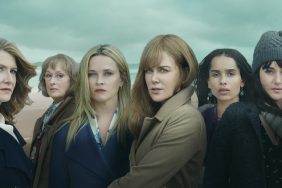Watching Wild, I couldn’t help but compare it to other solitary nature movies like Into the Wild and 127 Hours. Every movie deserves to be appreciated on its own merits, and Cheryl Strayed certainly wasn’t thinking about Chris McCandless or Aron Ralston when she made her trek, but hers does fall within a storied history of genre movies. It’s a favorable comparison, and also a key to some of its shortcomings. Just in case, SPOILER WARNING for 127 Hours and Into the Wild, but nothing major for the new movie Wild.
Cheryl Strayed (Reese Witherspoon) went to a bad place after her mother (Laura Dern) died. She decides to hike the Pacific Crest Trail, 1100 miles, while she reflects on her failed marriage and descent into drug addiction.
What works best in Wild is the nature adventure. You don’t need to know anything about camping to appreciate Cheryl packing her backpack to the gills and struggling to lift it up. There are some cute moments where scary noises are revealed to be something adorably harmless. Even watching her eat is thrilling, and I normally hate scenes of movie eating, because we’ve seen how much she struggled to make that food. Likewise, Ralston’s methods of surviving while stuck in a canyon and McCandless’s own self-sufficiency in their respective movies were engrossing. And like McCandless’s encounters with people on the trail were touching, Strayed’s moment with a singing child is irresistible.
Witherspoon is captivating and her performance makes the movie, likewise also Emile Hirsch and James Franco made theirs. What Witherspoon does with expression and not a lot of dialogue is so good, you wish that there weren’t flashbacks or voiceover and they’d just trust her to tell the whole story. She acts and appears genuinely younger in the flashback scenes. It’s a palpable evolution.
The flashbacks parallel Strayed’s place in her outdoor journey. That’s a little on the nose, essentially saying, “This is like when I got addicted to heroin. This is like when I cheated on my husband.” The flashbacks on their own are effective though. As in Dallas Buyers Club, director Jean-Marc Vallee doesn’t linger on the heavy stuff. He gets to the hardcore moment and then gets out. He’s not playing up Strayed’s most vulnerable moments for attention and acclaim. It’s raw, honest and tasteful, but the fact that there are flashbacks at all means certain parts of the story are not being revealed in the present.
It’s a storytelling choice and it may be the format of author Strayed’s autobiography for all I know. If I’m going to compare to other movies, 127 Hours had that dream sequence. That’s kind of a cheat when we know his story ends with a severed arm. So Wild is an entirely worthwhile film and performance. The quibbles may only be a matter of personal narrative preference.

Fred Topel is a staff writer at CraveOnline and the man behind Best Episode Ever and The Shelf Space Awards. Follow him on Twitter at @FredTopel.







